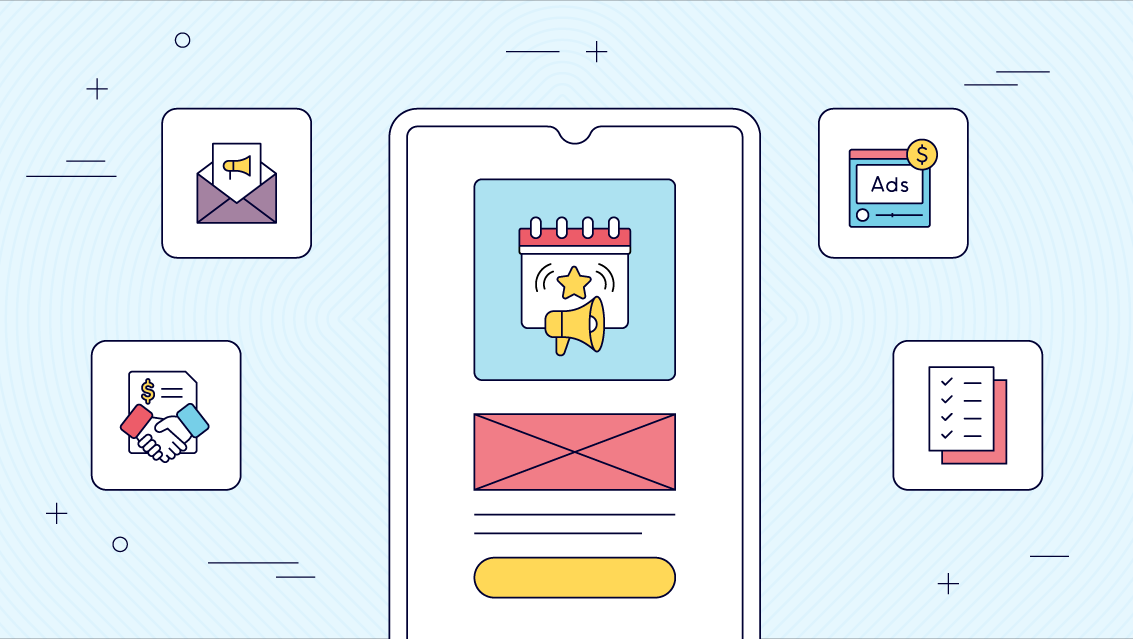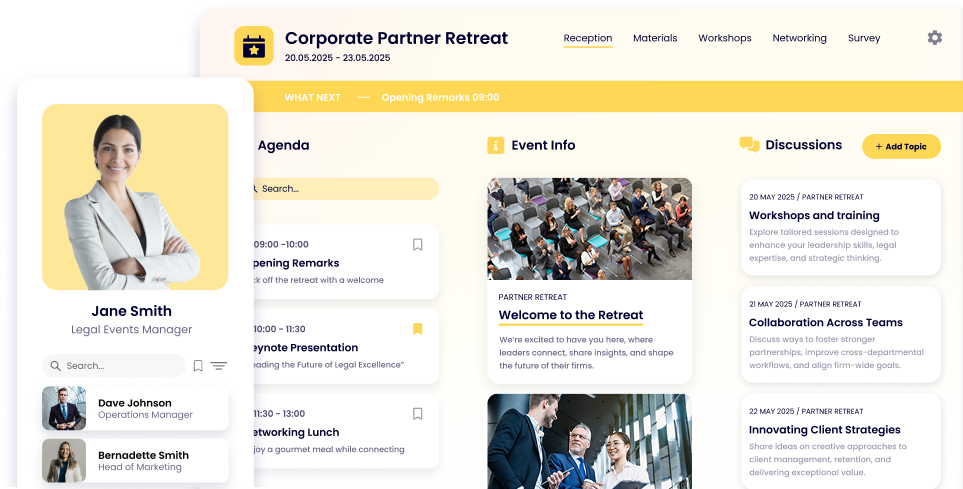Top B2B Event Marketing Strategies for Success in 2025

Lisa Broom | Head of Marketing

B2B event marketing is essential for generating leads, fostering relationships, and increasing brand awareness. This article presents key strategies to create successful b2b events or networking during b2b conferences. Learn how to effectively plan, execute, and evaluate your B2B marketing efforts.
Key Takeaways
- B2B event marketing is vital for building relationships and generating leads, with 73% of marketers projecting budget increases for events in 2025.
- Successful B2B event marketing requires clear objectives, advanced promotion, and swift follow-up with attendees to maximize engagement and nurture leads.
- Different event formats, such as conferences and webinars, provide unique benefits and opportunities for businesses to connect with their target audience effectively.
Understanding B2B Event Marketing
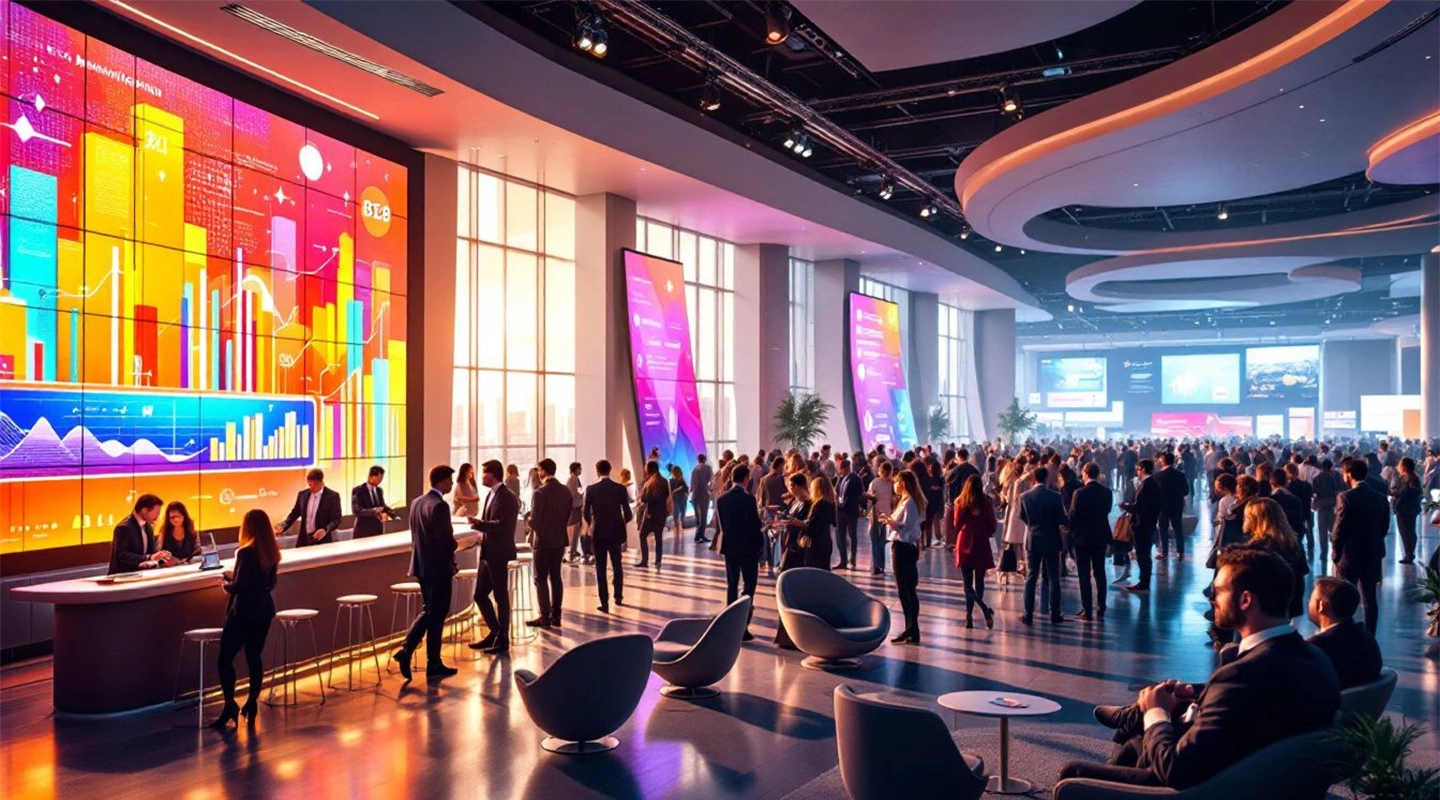
B2B event marketing involves organizing events targeted at businesses to foster interactions, generate leads, educate attendees, build brand awareness, and strengthen relationships. These events are a cornerstone of many marketing strategies, leveraging both offline and online channels to create meaningful engagements. Key components include human interaction, networking opportunities, and the use of various event formats.
The primary benefit of B2B event marketing lies in its ability to attract a loyal customer base and develop a competitive advantage. These events provide a unique opportunity for businesses to pitch directly and generate leads, showcasing their offerings and engaging with potential clients. For instance, trade shows and conferences provide unique avenues for businesses to connect with industry peers, gain insights, and establish business relationships.
B2B events also enhance visibility and differentiate businesses from competitors. Both in-person and virtual live events build trust and develop strong business relationships. With 60% of B2B marketers planning to utilize in-person events as a core marketing channel in 2023, the significance of these events is clear.
Importance of B2B Event Marketing in 2025
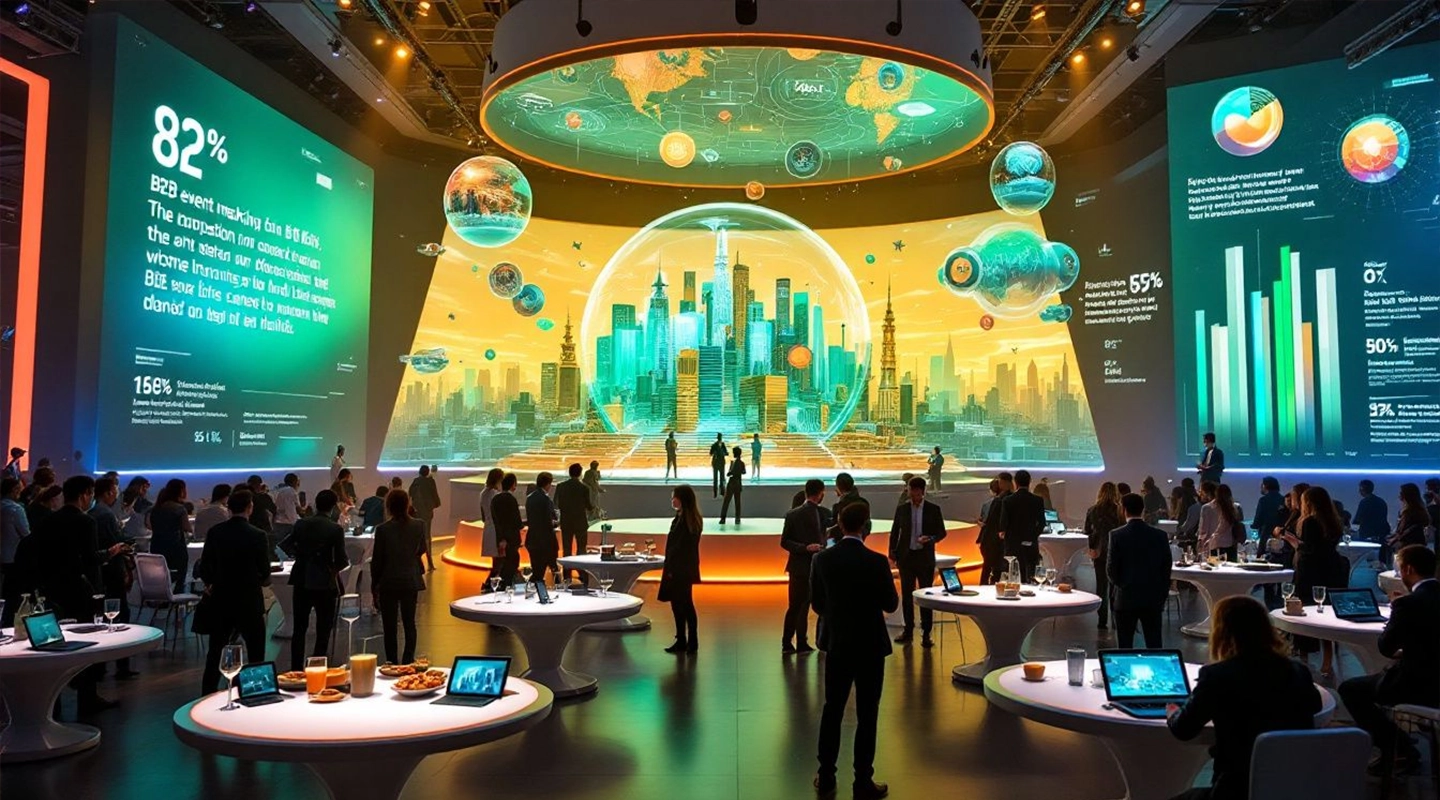
In 2025, B2B event marketing remains a dominant force, comprising 40% of the total event marketing industry. With 73% of event marketers expecting budget increases, the investment in events highlights their value in achieving business objectives. Face-to-face interactions at events significantly boost trust, with 77% of participants expressing increased trust in brands after such engagements.
Live events consistently top the list of effective B2B marketing tactics, favored for fostering meaningful connections and building brand awareness. According to 87% of C-Suite executives, live events excel in brand awareness and relationship building. In a digital world, these real-life interactions are invaluable for reaching decision-makers and establishing lasting business relationships.
The celebration of returning to real-life hosting reflects the enduring importance of in-person events in the B2B industry. With conferences and B2B events being the top area of marketing spending for many businesses, their role in navigating business challenges and driving business growth cannot be overstated.
Popular Types of B2B Events
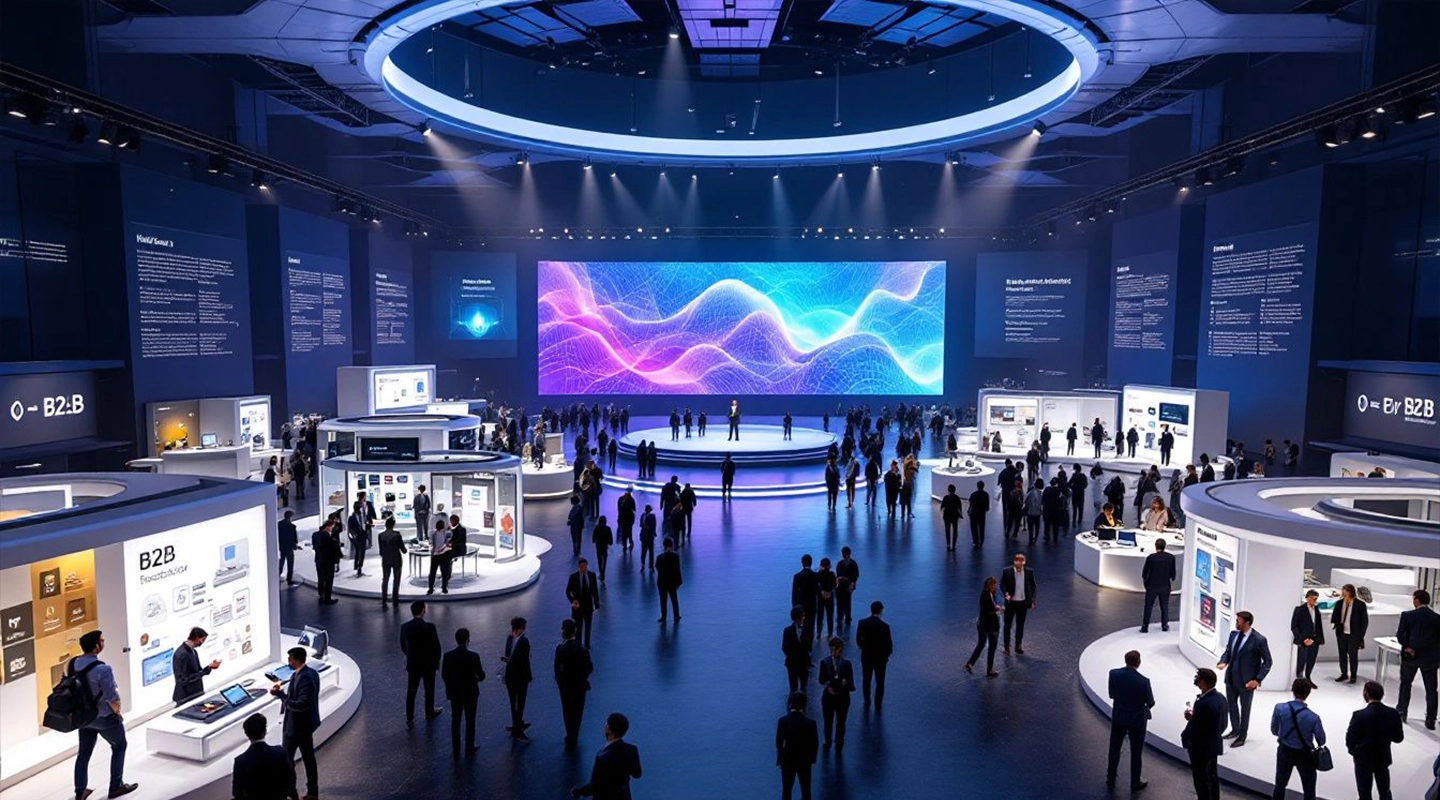
B2B events come in various formats, each serving different purposes and offering unique benefits. Popular B2B events include:
- Conferences: Large-scale events that bring together industry professionals for networking opportunities, educational sessions, and keynote speeches.
- Webinars: Online seminars that allow businesses to reach a global audience, offering flexibility and convenience.
- Trade Shows: Exhibitions where companies showcase their products and services, attracting potential clients and partners.
- Networking Events: Gatherings focused on building business relationships and exchanging ideas.
- Roundtables or VIP Dinners: Exclusive settings for high-level discussions and intimate networking.
- Roadshows: Events held in multiple locations to reach a broader audience and increase brand awareness.
- Award Ceremonies: Celebrations recognizing industry achievements, enhancing brand recognition and credibility.
- Industry Events: Specialized events tailored to a particular industry, providing targeted networking and learning opportunities.
These event types play a crucial role in a comprehensive B2B event marketing strategy, allowing businesses to engage with their target market in different ways and achieve various event goals.
3 Tips for Successful B2B Event Marketing
Successful B2B event marketing requires a strategic approach, integrating seamlessly with overall marketing strategies to enhance effectiveness. Here are three essential tips to ensure your event marketing efforts yield the desired results: working with KPIs in mind, promoting in advance, and chasing leads and connections quickly.
Work with KPIs in mind
Clear goals, such as lead generation or revenue targets, are crucial for measuring the success of B2B events. Monitoring key performance indicators (KPIs) like attendee numbers and lead quality helps gauge the effectiveness of your event marketing efforts. Real-time KPI tracking allows marketing teams to adapt strategies promptly for better outcomes.
Common KPIs include marketing qualified leads, sales qualified opportunities, and customer lifetime value. These metrics measure event success and align marketing efforts with strategic business goals, significantly enhancing decision-making within marketing teams.
Promote in Advance
Effective pre-event promotion maximizes attendance and ensures your target audience is aware of the event. Using various marketing channels like email campaigns and social media builds excitement and increases registrations ahead of the event. Segmenting your email list to tailor invitations to the ideal attendee profile can enhance engagement further.
Attending events and conferences offers unparalleled opportunities for networking and learning within your industry. By booking meetings in advance, you can ensure meaningful interactions with key industry professionals and potential clients, maximizing the value of your attendance. Pre-scheduled meetings allow for focused discussions, helping to establish strong business relationships and explore potential collaborations. This strategic approach not only enhances your event experience but also aligns with your broader event marketing efforts, ensuring that your participation translates into tangible business growth and lead generation.
Chase Leads and Connections quickly after the event
Prompt follow-up with event attendees is crucial for nurturing leads and maintaining engagement. Following up within 24 hours significantly enhances the chances of converting interactions into sales. Using platforms like LinkedIn or email for follow-up helps establish long-term professional relationships.
Effective post-event follow-ups maximize the positive outcomes of conversations held during the event. Integrating event outcomes into broader marketing strategies ensures that leads gathered at events are effectively followed up and nurtured.
4 Strategies to Market Your B2B Event
Effectively marketing your B2B event, regardless on if its virtual or hybrid event, is crucial for ensuring its success and achieving your event objectives. Here are five strategies to enhance your event marketing efforts:
- Leverage Multiple Marketing Channels: Utilize a mix of marketing channels, including social media, email campaigns, and industry publications, to reach your target audience. Tailor your messaging to resonate with the particular industry you’re targeting, ensuring it aligns with your event’s tone and objectives.
- Engage with Potential Attendees Early: Start promoting your hybrid or virtual events well in advance to generate interest and increase registrations. Use engaging content, such as sneak peeks of the event agenda or interactive sessions, to capture the attention of potential clients and industry professionals.
- Utilize an Event App: Enhance attendee engagement by offering an event app that provides real-time updates, networking opportunities, and personalized schedules. This tool can improve the overall event experience and facilitate the lead generation efforts for sponsors but also help attendees build meaningful relationships.
- Create Compelling Content: Develop marketing collateral that highlights the unique benefits of attending your event. This includes showcasing past event success stories, testimonials from previous attendees, and exclusive insights into the event’s content and speakers.
By incorporating these strategies, you can maximize the impact of your B2B event marketing efforts, ensuring your event’s success and fostering lasting business growth.
Post-Event Follow-Up and Lead Nurturing
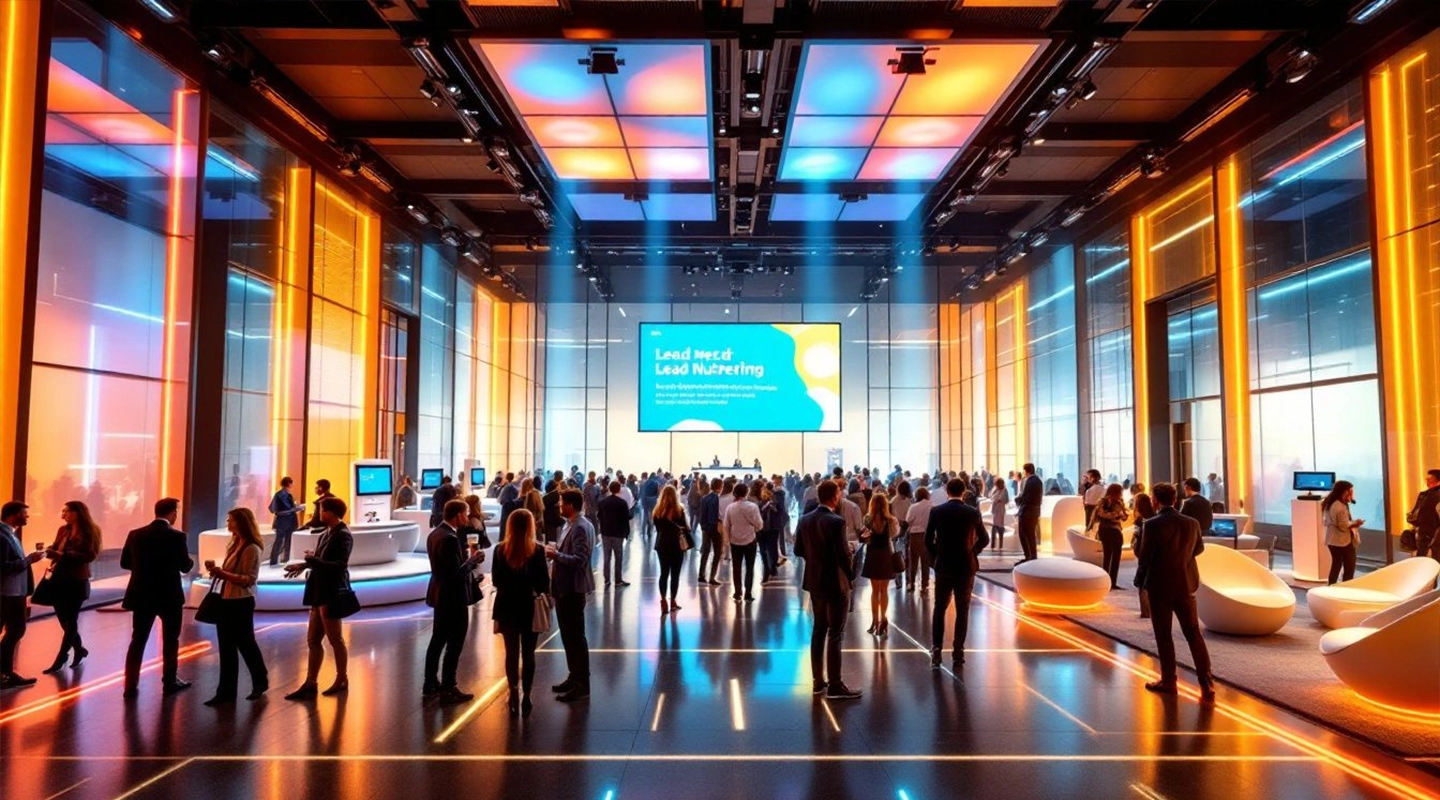
Post-event follow-up is critical for nurturing leads and building lasting relationships. Prompt follow-up within 24 hours maintains engagement and advances the relationship. Sending personalized thank-you emails shortly after the event fosters a deeper connection with attendees.
Using automation tools can streamline follow-up efforts while still allowing for personalization. Continuous interaction through multiple touchpoints enhances lead nurturing, ultimately leading to more conversions and lasting business relationships.
Measuring Event Success
Key metrics for event success include registration numbers, attendance rates, and no-show rates. Tracking the revenue influenced by events helps evaluate the long-term return on investment. The number of new leads generated and the influenced pipeline value are crucial indicators of event performance.
Attendee satisfaction can be gauged through surveys and Net Promoter Score (NPS) evaluations. Collecting and analyzing these metrics can highlight areas for improvement in future events, ensuring continuous enhancement of your B2B event marketing strategy.
Summary
To sum up, successful B2B event marketing in 2025 hinges on strategic planning, clear objectives, and effective follow-up. By understanding your target audience, choosing the right event formats, and leveraging key performance indicators, you can create impactful events that drive business growth.
As we navigate an increasingly digital world, the power of well-executed B2B events remains unmatched. Embrace these strategies to elevate your event marketing efforts and achieve lasting success in your business endeavors.
FAQs
What is a typical business to business event?
A typical business-to-business (B2B) event is a conference where organizations come together to discuss industry-relevant topics through presentations, workshops, and networking opportunities. Such events foster collaboration and information exchange among professionals.
What are the 7 P's of B2B marketing?
The 7 P’s of B2B marketing are Product, Price, Place, Promotion, People, Process, and Physical Evidence, forming a comprehensive framework to guide marketing strategies effectively. Emphasizing these elements can significantly enhance B2B marketing efforts.
What is B2B marketing with example?
B2B marketing refers to strategies used by one business to sell products or services to another business. An example is a software company providing enterprise solutions targeted at other companies.
What is a B2B event marketing?
B2B event marketing is an offline strategy that emphasizes human interaction and networking, allowing businesses to learn from peers and gain insights into effective strategies. Therefore, it is essential to focus on delivering maximum value to attendees, as their experiences often resonate more than conventional sales pitches.
Why is B2B event marketing important in 2025?
B2B event marketing is essential in 2025 for effectively engaging decision-makers and building trust in a digital landscape. It facilitates the development of lasting business relationships that are vital for success.



